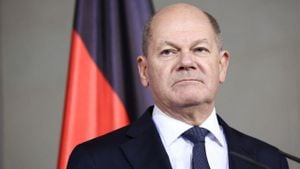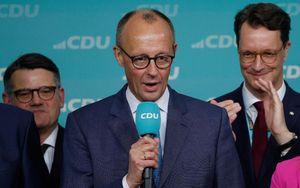Switzerland is poised to play a significant role if the call for peacekeeping forces arises amid the continued conflict between Ukraine and Russia. Chief of the Swiss Armed Forces, General Thomas Suessli, noted recently, "If the request would come, it would be up to our government and parliament to decide. We could probably send about 200 soldiers for nine to twelve months." This statement captures the essence of Switzerland's potential involvement.
Generals and political leaders worldwide are considering the future steps needed to stabilize the region, with the discussions around Swiss peacekeeping contributing to broader diplomatic efforts to resolve the conflict. Suessli emphasized the hypothetical nature of these talks, stating, "The discussions about sending peacekeepers are still purely hypothetical as it is unclear how the situation will develop between Russia and Ukraine." The general's insights reveal the cautious approach to deployment, hinging on the establishment of peace.
Currently, there are no formal requests from the United Nations for troop deployment, creating yet another layer of complexity. Suessli elaborates, stating, "There is still no peace, and there has not been any request from the United Nations." This conditionality serves as both a limitation and an opportunity; Switzerland's participation hinges not just on domestic approval but also on global diplomatic agreements.
Reflecting on its historical stance, Switzerland has been known for its neutral position and has contributed to several peacekeeping missions globally. Notably, it's active support for NATO's KFOR forces stationed in Kosovo demonstrates its commitment to international peace efforts. Suessli noted, "Switzerland participates in several peace missions around the world, with its largest being Kosovo, where troops are deployed as part of KFOR." This commitment to peacekeeping emphasizes Switzerland’s capacity and willingness to assist when required.
Despite being known for neutrality, other European nations are also conversing about the potential for sending military aid as part of peacekeeping endeavors. The overarching goal remains to expedite diplomatic discussions aimed at ending the three-year-long conflict between Ukraine and Russia.
Each statement from Suessli points toward rigorous deliberations within Switzerland’s political framework and the uncertainty surrounding the operational aspects of potential troop involvement. The decision-making process, involving both government and parliament, hints at the importance of national and international consensus.
Switzerland's consideration of peacekeeping troops reflects its historical role as more than just an observer. Active participation could reshape its image on the global stage as both impartial and proactive. The political climate around such discussions will likely evolve as the situation develops, making Switzerland's future contributions pivotal to the anticipated peacekeeping movement.
While the structure of the proposed mission remains ambiguous, the articulation from Suessli provides insight: "We would develop training concepts to prepare our personnel for participation if ordered to engage." This insight not only reflects military preparedness but also denotes the ethical framework within which Swiss operations are conducted.
Looking forward, the solutions may hinge on cooperation between various nations, akin to the collective efforts observed during earlier peace operations. Collaborative frameworks could denote hope for Ukraine, as the conflict’s resolution relies heavily on international solidarity.
For now, the prospect of Swiss forces participating remains tethered to diplomatic negotiations, peace treaties, and potential UN interventions. Switzerland remains cautious but ready, echoing its enduring commitment to peace.
Concluding, the Swiss perspective on aiding Ukraine reflects broader global dynamics of security and diplomacy. The delicate balance of neutrality and active participation may define the country’s role moving forward, emphasizing the need for unity and support from nations committed to restoring peace. The impending discussions among EU nations about contributions to Ukraine signal the urgency and importance of addressing the continuing strife, underpinning the significant role Switzerland could play should circumstances allow.



